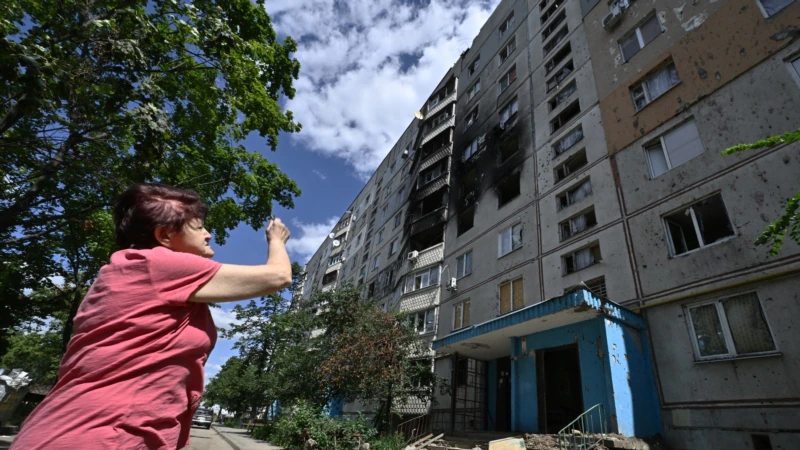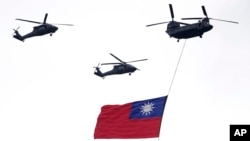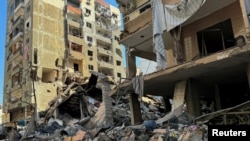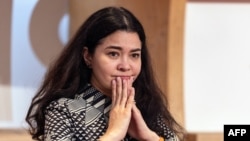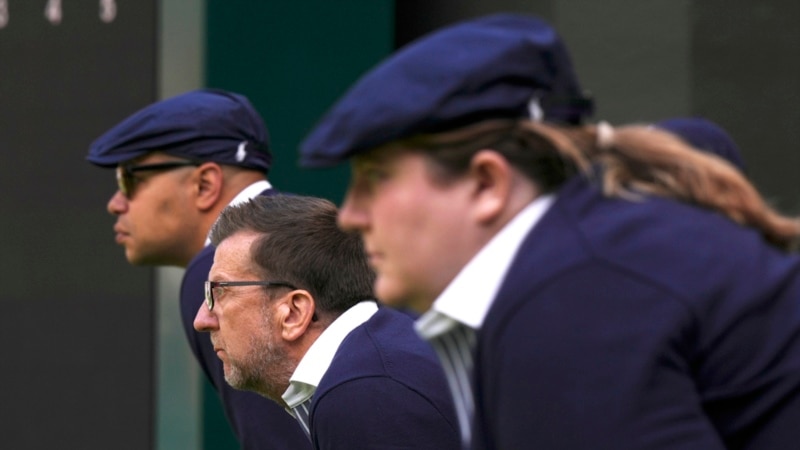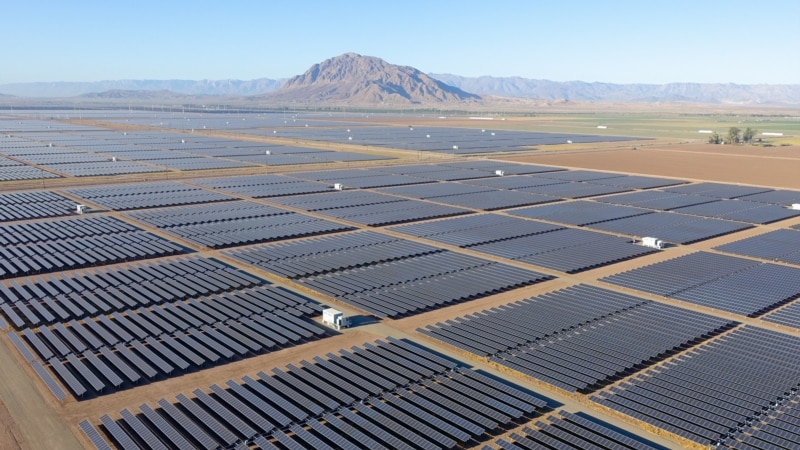For full coverage of the crisis in Ukraine, visit Flashpoint Ukraine.
The latest developments in the conflict between Russia and Ukraine. All times EDT.
1:05 p.m.: The United Nations chief warned the world Monday that “humanity is just one misunderstanding, one miscalculation away from nuclear annihilation,” The Associated Press reported.
Secretary-General Antonio Guterres gave the dire warning at the opening of the long-delayed high-level meeting to review the landmark 50-year-old treaty aimed at preventing the spread of nuclear weapons and eventually achieving a nuclear-free world.
He cited especially the war in Ukraine and the threat of nuclear weapons to conflicts in the Middle East and Asia, two regions “edging towards catastrophe.”
Guterres told many ministers, officials and diplomats attending the month-long conference to review the Nuclear Nonproliferation Treaty that the meeting is taking place “at a critical juncture for our collective peace and security” and “at a time of nuclear danger not seen since the height of the Cold War.”
“All this at a time when the risks of proliferation are growing and guardrails to prevent escalation are weakening,” he said, “And when crises — with nuclear undertones — are festering from the Middle East and the Korean Peninsula to Russia’s invasion of Ukraine.”
12:40 p.m.:
12:00 p.m.: European Commission President Ursula von der Leyen has warned that Europe must prepare for the “worst situation” with regard to Russian gas supplies, Radio Free Europe/Radio Liberty reported.
“Since Russia has already completely or partially cut off gas supplies to 12 [EU] member countries, we must all prepare for the worst situation,” von der Leyen told El Mundo, a Spanish-language newspaper.
Russia has suspended gas deliveries to several EU countries for their refusal to pay for delivery in rubles, a demand that European countries have said is linked to Kremlin attempts to ease the impact of Western sanctions on Russia over its full-scale invasion of Ukraine.
Russia has also lowered deliveries of gas to Germany through the Nord Stream 1 pipeline over a maintenance issue that Germany has said has been manufactured by Russia as retaliation for Western sanctions.
11:15 a.m.: U.N. World Food Program Executive Director David Beasley on Monday welcomed the news that a ship carrying Ukrainian grain has left the Black Sea port of Odesa for the first time since a deal was brokered between Russia and Ukraine to allow safe passage of grain shipments.
10:50 a.m.: Rising concern over the impact of a potential Russian gas cutoff is fueling the debate in Germany over whether the country should switch off its last three nuclear power plants as planned at the end of this year, The Associated Press reported.
The door to some kind of extension appeared to open a crack after the Economy Ministry in mid-July announced a new “stress test” on the security of electricity supplies. It’s supposed to take into account a tougher scenario than a previous test, concluded in May, that found supplies were assured.
Since then, Russia has reduced natural gas supplies through the Nord Stream 1 pipeline to Germany to 20% of capacity amid tensions over the war in Ukraine. It cited technical issues that Germany says are only an excuse for a political power play. Russia recently has accounted for about a third of Germany’s gas supply, and there are concerns it could turn off the tap altogether.
“A lot speaks for not switching off the safe and climate-friendly nuclear power plants, but if necessary using them until 2024,” Finance Minister Christian Lindner, the Free Democrats’ leader, told Sunday’s Bild am Sonntag newspaper. He called for Economy Minister Robert Habeck, who is responsible for energy, to stop the use of gas to generate electricity.
10:35 a.m.:
10:15 a.m.: The International Rescue Committee on Monday welcomed the first grain shipment to leave Ukraine since Russia invaded in late February, saying in a statement that it is the first step in providing relief for the dire global hunger crisis.
“I was relieved to see this shipment leave Odessa this morning. This is the first of many lifelines needed to ease the global food crisis and help the millions of people at risk of starving around the world,” Marysia Zapasnik, Ukraine Country Director at the IRC, said. “However, we cannot forget that this blockade should never have happened in the first place. Preventing food from leaving Ukraine has hurt the hungry, especially those suffering a looming famine in East Africa, where many are already dying of hunger, most of them children.”
“Now, these shipments must be guaranteed consistent safe passage – something we are particularly concerned about given Odessa port has been attacked twice just in the last week,” Zapasnik said. “The international community must ensure regular and predictable food shipments urgently reach those on the brink of starvation and that Ukraine’s farmers are able to safely grow and transport crops to the ports.”
9:50 a.m.:
9:25 a.m.: Russian lawmakers on Monday introduced a bill to the lower house of the country’s parliament banning the adoption of Russian children by citizens of “unfriendly countries,” Reuters reported.
“Sending our children to be raised in ‘unfriendly countries’ is a blow to the future of the nation,” the bill’s authors wrote.
Russia’s list of unfriendly countries was expanded after many nations imposed sanctions in response to Russia’s deployment of troops to Ukraine in February. It currently includes the United States, United Kingdom, all European Union member states, as well as Japan and South Korea.
8:50 a.m.:
8:35 a.m.: News that his ship would be allowed to leave the Ukrainian port of Odesa carrying grain was the “best feeling” of the year, a joyful crew member said on Monday, adding he was worried about mines, Reuters reported.
“It was a great feeling,” junior engineer Abdullah Jendi, from Syria, said. “Everyone on the ship was very happy. I can say that it was the best feeling we have had in 2022.” The Sierra Leone-flagged Razoni left Odesa bound for Lebanon on Monday with 27,000 metric tons of grain. The ship will pass through the Bosphorus Strait on Tuesday.
“To be honest, I am scared from the fact that there are naval mines,” Jendi said. “This is the only thing that I fear during this trip, as for the other things, we are used to them as sailors.” He said of being able to leave: “It’s a great feeling, I haven’t seen my family in over a year because of my work at sea.”
“Both sides at war will lose, even the victor of war will have lost because of the human and material losses,” Jendi said. “In my opinion, the people of Ukraine don’t deserve this because they are good and peaceful people.”
8:20 a.m.:
8:10 a.m.: Pope Francis will attend a meeting of religious leaders in Kazakhstan in September, the Vatican said on Monday, according to Reuters. It is a gathering where he has said previously he hoped to meet with the Russian Orthodox patriarch, who backs the war in Ukraine.
Francis is set to be in the capital Nur-Sultan from September 13-15 to attend the VII Congress of Leaders of World and Traditional Religions, the Vatican said.
The pope has said in several recent interviews that he hopes to meet in the Kazakh capital with patriarch Kirill, who has given his full-throated backing to Russia’s invasion of Ukraine, which began on February 24.
Francis had planned to meet Kirill on June 14 in Jerusalem but cancelled that meeting on the advice of Vatican diplomats.
7:55 a.m.: The U.N. Office for the Coordination of Humanitarian Affairs (UN OCHA) has released its latest report on Ukraine, saying on Twitter Monday that continuing hostilities have increased the toll on civilians across Ukraine.
7:45 a.m.: A new poll shows that 79% of Ukrainians support a visa regime with Russia, the Kyiv Independent reported Monday on Twitter.
“According to a survey conducted by the Kyiv International Institute of Sociology from July 6-20, most Ukrainians agree that the border should remain closed between Ukraine and Russia,” the news organization reported.
7:30 a.m.: The life of Viktor Bout, the Russian arms dealer jailed in the United States and linked to a possible swap for two U.S. citizens detained by Moscow, sometimes reads like a far-fetched spy thriller, Reuters reported.
Variously dubbed “the merchant of death” and “the sanctions buster” for his ability to get around arms embargoes, Bout, 55, was one of the world’s most wanted men prior to his 2008 arrest on multiple charges related to arms trafficking.
For almost two decades, Bout became the world’s most notorious arms dealer, selling weaponry to rogue states, rebel groups and murderous warlords in Africa, Asia and South America.
His notoriety was such that his life helped inspire a Hollywood film, 2005’s Lord of War, starring Nicholas Cage as Yuri Orlov, an arms dealer loosely based on Bout.
7:10 a.m.:
6:50 a.m.: Ukraine is launching a portal to trace Ukrainian children affected by Russia’s war, the Kyiv Independent reported Monday on Twitter.
“Called “Children of War,” the platform aims to help parents and law enforcement collect information about children killed by the war, and those who went missing or were forcibly deported to Russia,” the news organization said.
6:45 a.m.: In Moscow, Kremlin spokesman Dmitry Peskov hailed the departure of the first ship carrying Ukrainian grain from the port of Odesa as “very positive,” saying it would help test the “efficiency of the mechanisms that were agreed during the talks in Istanbul,” The Associated Press reported.
Russia and Ukraine signed separate agreements with Turkey and the U.N. clearing the way for Ukraine — one of the world’s key breadbaskets — to export 22 million tons of grain and other agricultural goods that have been stuck in Black Sea ports because of Russia’s invasion.
The deals also allow Russia to export grain and fertilizers.
6:05 a.m.: NATO Secretary General Jens Stoltenberg on Monday welcomed the first commercial shipment of grain from Odesa, Ukraine, which is the result of a U.N.-brokered negotiation.
5:15 a.m.: The first ship carrying grain to leave Ukraine under a safe passage agreement will anchor off the coast of Istanbul around 1200 GMT on Tuesday for a joint inspection, Turkish Defence Minister Hulusi Akar said on Monday, according to Reuters.
Akar was speaking in an interview with Turkey’s state-owned Anadolu news agency after the Sierra Leone-flagged ship Razoni, which is loaded with corn, left the Ukrainian port of Odesa for Lebanon.
As part of the agreement, a Joint Coordination Centre was set up in Istanbul with personnel from the United Nations, Russia, Ukraine and Turkey.
4:25 a.m.: The first shipment of Ukrainian grain left the port of Odessa on Monday morning, Turkey announced, according to Agence France-Presse.
“The ship Razoni has left the port of Odessa bound for Tripoli in Lebanon,” the Turkish ministry said in a statement. “It is expected in Istanbul on August 2. It will then continue its journey after it has been inspected in Istanbul,” the statement added.
Other convoys would follow, respecting the maritime corridor and the agreed formalities, it said. The Joint Coordination Centre, the organization overseeing the grain exports, said the Razoni is carrying “over 26,000 metric tons” of maize.
The blockage of deliveries from warring Russia and Ukraine — two of the world’s biggest grain exporters — has contributed to soaring food prices, hitting the world’s poorest nations especially hard. Last month both sides signed a landmark deal with Turkey and the United Nations aimed at relieving the global food crisis.
4:05 a.m.: Ukraine’s Minister of Foreign Affairs expressed relief Monday on Twitter that the first shipment of grain has left the port of Odesa since the start of Russia’s invasion in late February.
3:57 a.m.
The United Nations’ Secretary-General “welcomes” the departure of the first commercial vessel leaving Ukraine’s port of Odesa since Feb. 26, 2022, according to a statement posted by the spokesperson for the secretary-general.
The ship, bound for the port of Tripoli, Lebanon, is carrying 26,527 metric tons of corn, and is the first ship to depart under the Black Sea Grain Initiative to get grain to markets all over the world.
“The Secretary-General hopes that this will be the first of many commercial ships moving in accordance with the Initiative signed, and that this will bring much-needed stability and relief to global food security especially in the most fragile humanitarian contexts,” said the statement.
2:50 a.m.:
UkraineWorld shares image of Azovstal defenders’ families calling on international organizations to rescue Ukrainian POWs.
2:43 a.m.:
2:31 a.m.:
1:30 a.m.: Britain’s defense ministry said Monday that Russian forces had made only slow progress during the previous four days as they tried tactical assaults in the area northeast of Donetsk. The ministry said Russia is also likely shifting “a significant number of its forces” from the northern part of the Donbas region in eastern Ukraine to southern Ukraine.
12:10 a.m.: Britain will now require foreign companies holding U.K. property to identify their true owners in an official register, the government said on Monday, as part of a crackdown on Russian oligarchs and corrupt elites laundering illicit wealth.
The “Register of Overseas Entities” is part of a wider economic crime law enacted this year in an effort to stop the flow of illicit Russian cash into London following Moscow’s invasion of Ukraine.
Foreign entities that own land in the U.K. that is within the scope of the register will have six months to comply by identifying their beneficial owner to Companies House.
The register will apply to property bought since January 1999 in England and Wales, and since December 2014 in Scotland.
Those not complying with the new rules could face sanctions including fines of up to $3,043 per day or five years in prison.

